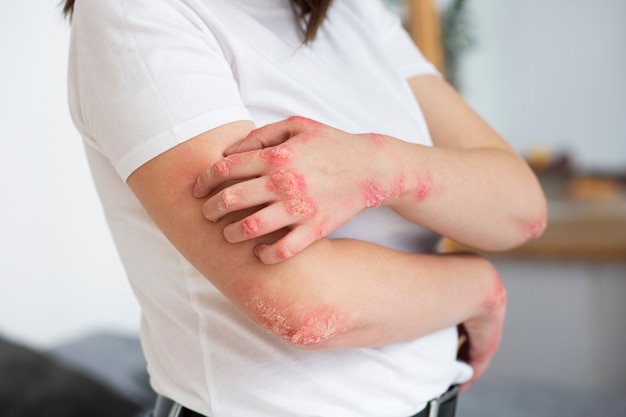
Do you struggle with eczema? Certain foods might help reduce the inflammation that causes dry, itchy, and flaky skin, according to nutritionist Olga Hamilton. Eczema, a chronic inflammatory skin condition, often leaves the skin feeling sore. In the UK, it’s estimated that one in five children and one in 12 adults suffer from eczema. While your diet might not be the direct cause, some foods can trigger flare-ups.
Research has shown that dietary factors can make eczema worse, with reactions happening within minutes or hours after eating certain foods. Here are five dietary changes to help manage your eczema:
1. Probiotics: These are live microorganisms that can support your immune system and inhibit harmful bacteria in your gut. Types like Lactobacillus and Bifidobacterium are common and well-researched for gut health. Increased probiotic bacteria can help protect against eczema by supporting immune function and reducing inflammation. Probiotics can be found in yogurt, water-based kefir, raw cheese, and fermented foods like natto, tempeh, miso, kombucha, sauerkraut, and kimchi. Try adding a small amount of these foods daily.
2. Prebiotics: Prebiotics are carbohydrates that your body can’t digest. They pass through the small intestine and feed probiotic bacteria, increasing their numbers. Prebiotic-rich foods include beans, legumes, Jerusalem artichokes, leeks, chicory, asparagus, mushrooms, garlic, and onions. Eating prebiotics alongside probiotics boosts their effectiveness and resistance to stomach acid. Aim for three portions of these vegetables daily.
3. Liver-Supporting Foods: Poor liver function can worsen eczema. The liver filters blood from the digestive tract, but if it’s overloaded with toxins, it can’t function effectively. This leads to toxin buildup that can cause inflammation and eczema. Including cruciferous vegetables like cabbage, kale, broccoli, and Brussels sprouts in your diet can help detoxify the liver and reduce inflammation. These vegetables also provide folates, vitamins K and E, and chlorophyll, which support liver health. Aim for two portions of cruciferous vegetables each day.
4. Turmeric: This spice, common in Asian cuisine, contains curcumin, which has anti-inflammatory and antioxidant properties. Curcumin has been used to treat eczema and may help restore levels of glutathione, an antioxidant that strengthens the immune system. Using turmeric in your diet might help reduce eczema symptoms.
5. Vitamin D: Essential for health and produced in response to sun exposure, vitamin D can also be found in foods like oily fish, enriched mushrooms, and grass-fed butter. Studies have shown that people with eczema often have lower levels of vitamin D. This vitamin acts as an immunomodulator, supporting immune system function and reducing inflammation. Given its common deficiency, increasing your vitamin D intake through diet and supplements might help manage eczema.
Consider making these dietary changes to potentially ease your eczema symptoms and improve your overall skin health.

